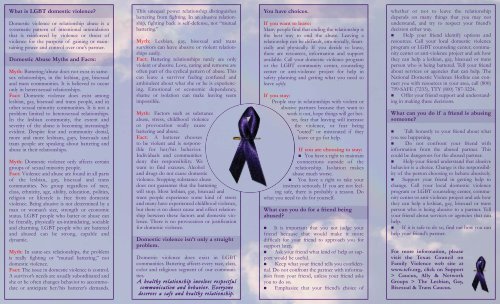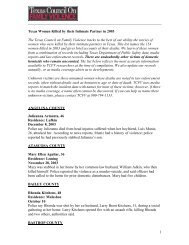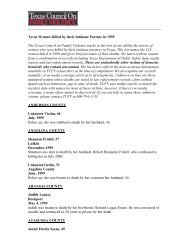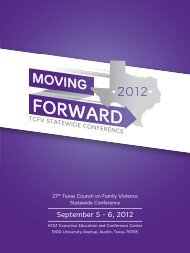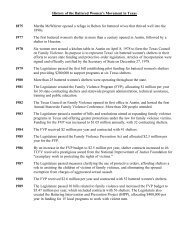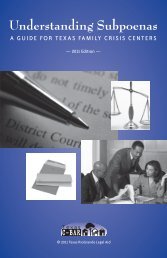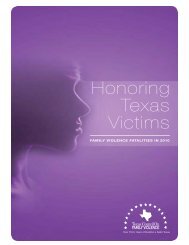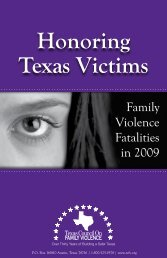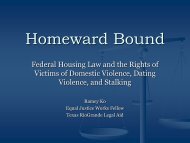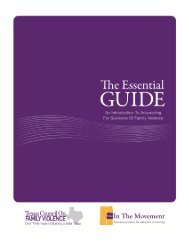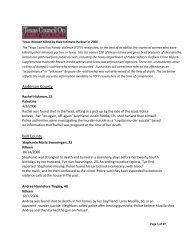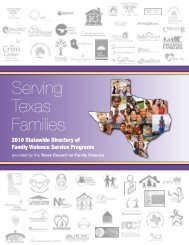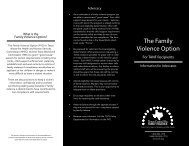LGBT Caucus Brochure - Texas Council on Family Violence
LGBT Caucus Brochure - Texas Council on Family Violence
LGBT Caucus Brochure - Texas Council on Family Violence
- No tags were found...
Create successful ePaper yourself
Turn your PDF publications into a flip-book with our unique Google optimized e-Paper software.
tcfv - lgbt brochure.qxp 8/29/2006 10:18 AM Page 2What is <str<strong>on</strong>g>LGBT</str<strong>on</strong>g> domestic violence?Domestic violence or relati<strong>on</strong>ship abuse is asystematic pattern of intenti<strong>on</strong>al intimidati<strong>on</strong>that is reinforced by violence or threat ofviolence for the purpose of gaining or maintainingpower and c<strong>on</strong>trol over <strong>on</strong>e’s partner.Domestic Abuse Myths and Facts:Myth: Battering/abuse does not exist in samesexrelati<strong>on</strong>ships, in the lesbian, gay, bisexualand trans communities. It is believed to occur<strong>on</strong>ly in heterosexual relati<strong>on</strong>ships.Fact: Domestic violence does exist am<strong>on</strong>glesbian, gay, bisexual and trans people, and inother sexual minority communities. It is not aproblem limited to heterosexual relati<strong>on</strong>ships.In the lesbian community, the extent andseverity of the abuse is becoming increasinglyevident. Despite fear and community denial,more and more lesbians, gays, bisexuals andtrans people are speaking about battering andabuse in their relati<strong>on</strong>ships.Myth: Domestic violence <strong>on</strong>ly affects certaingroups of sexual minority people.Fact: <strong>Violence</strong> and abuse are found in all partsof the lesbian, gay, bisexual and transcommunities. No group regardless of race,class, ethnicity, age, ability, educati<strong>on</strong>, politics,religi<strong>on</strong> or lifestyle is free from domesticviolence. Being abusive is not determined by aman or woman’s size, strength or ec<strong>on</strong>omicstatus. <str<strong>on</strong>g>LGBT</str<strong>on</strong>g> people who batter or abuse canbe friendly, physically un-intimidating, sociableand charming. <str<strong>on</strong>g>LGBT</str<strong>on</strong>g> people who are batteredand abused can be str<strong>on</strong>g, capable anddynamic.Myth: In same-sex relati<strong>on</strong>ships, the problemis really fighting or “mutual battering,” notdomestic violence.Fact: The issue in domestic violence is c<strong>on</strong>trol.A survivor’s needs are usually subordinated andshe or he often changes behavior to accommodateor anticipate her/his batterer’s demands.This unequal power relati<strong>on</strong>ship distinguishesbattering from fighting. In an abusive relati<strong>on</strong>ship,fighting back is self-defense, not “mutualbattering.”Myth: Lesbian, gay, bisexual and transsurvivors can leave abusive or violent relati<strong>on</strong>shipseasily.Fact: Battering relati<strong>on</strong>ships rarely are <strong>on</strong>lyviolent or abusive. Love, caring and remorse areoften part of the cyclical pattern of abuse. Thiscan leave a survivor feeling c<strong>on</strong>fused andambivalent about what she or he is experiencing.Emoti<strong>on</strong>al or ec<strong>on</strong>omic dependency,shame or isolati<strong>on</strong> can make leaving seemimpossible.Myth: Factors such as substanceabuse, stress, childhood violenceor provocati<strong>on</strong> really causebattering and abuse.Fact: A batterer choosesto be violent and is resp<strong>on</strong>siblefor her/his behavior.Individuals and communitiesdeny this resp<strong>on</strong>sibility. Wewant to find excuses. Alcoholand drugs do not cause domesticviolence. Stopping substance abusedoes not guarantee that the batteringwill stop. Most lesbian, gay, bisexual andtrans people experience some kind of stressand many have experienced childhood violence,but there is no direct cause and effect relati<strong>on</strong>shipbetween these factors and domestic violence.There is no provocati<strong>on</strong> or justificati<strong>on</strong>for domestic violence.Domestic violence isn’t <strong>on</strong>ly a straightproblem.Domestic violence does exist in <str<strong>on</strong>g>LGBT</str<strong>on</strong>g>communities. Battering affects every race, class,color and religious segment of our communities.A healthy relati<strong>on</strong>ship involves respectfulcommunicati<strong>on</strong> and behavior. Every<strong>on</strong>edeserves a safe and healthy relati<strong>on</strong>ship.You have choices.If you want to leave:Many people find that ending the relati<strong>on</strong>ship isthe best way to end the abuse. Leaving arelati<strong>on</strong>ship can be difficult, emoti<strong>on</strong>ally, financiallyand physically. If you decide to leave,there are resources, informati<strong>on</strong> and supportavailable. Call your domestic violence programor the <str<strong>on</strong>g>LGBT</str<strong>on</strong>g> community center, counselingcenter or anti-violence project for help insafety planning and getting what you need toleave safely.If you stay:People stay in relati<strong>on</strong>ships with violent orabusive partners because they want towork it out, hope things will get better,fear that leaving will increasethe violence, or fear being“outed” or mistreated if theyleave or go for help.If you are choosing to stay: You have a right to maintainc<strong>on</strong>necti<strong>on</strong>s outside of therelati<strong>on</strong>ship. Isolati<strong>on</strong> makesabuse much worse. You have a right to take yourinstincts seriously. If you are not feelingsafe, there is probably a reas<strong>on</strong>. Dowhat you need to do for yourself.What can you do for a friend beingabused? It is important that you not judge yourfriend because that would make it moredifficult for your friend to approach you forsupport later. Ask your friend what kind of help or supportwould be useful. Keep what your friend tells you c<strong>on</strong>fidential.Do not c<strong>on</strong>fr<strong>on</strong>t the partner with informati<strong>on</strong>from your friend, unless your friend asksyou to do so. Emphasize that your friend’s choice ofwhether or not to leave the relati<strong>on</strong>shipdepends <strong>on</strong> many things that you may notunderstand, and try to respect your friend’sdecisi<strong>on</strong> either way. Help your friend identify opti<strong>on</strong>s andresources. Call your local domestic violenceprogram or <str<strong>on</strong>g>LGBT</str<strong>on</strong>g> counseling center, communitycenter or anti-violence project and ask howthey can help a lesbian, gay, bisexual or transpers<strong>on</strong> who is being battered. Tell your friendabout services or agencies that can help. TheNati<strong>on</strong>al Domestic <strong>Violence</strong> Hotline can c<strong>on</strong>nectyou with resources in your area, call (800)799-SAFE (7233), TTY (800) 787-3224. Offer your friend support and understandingin making these decisi<strong>on</strong>s.What can you do if a friend is abusingsome<strong>on</strong>e? Talk h<strong>on</strong>estly to your friend about whatyou see happening. Do not c<strong>on</strong>fr<strong>on</strong>t your friend withinformati<strong>on</strong> from the abused partner. Thiscould be dangerous for the abused partner. Help your friend understand that abusivebehavior is a choice. Change is the resp<strong>on</strong>sibilityof the pers<strong>on</strong> choosing to behave abusively. Support your friend in getting help tochange. Call your local domestic violenceprogram or <str<strong>on</strong>g>LGBT</str<strong>on</strong>g> counseling center, communitycenter or anti-violence project and ask howthey can help a lesbian, gay, bisexual or transpers<strong>on</strong> who is being abusive to a partner. Tellyour friend about services or agencies that canhelp. If it is safe to do so, find out how you canhelp your friend’s partner.For more informati<strong>on</strong>, pleasevisit the <str<strong>on</strong>g>Texas</str<strong>on</strong>g> <str<strong>on</strong>g>Council</str<strong>on</strong>g> <strong>on</strong><strong>Family</strong> <strong>Violence</strong> web site atwww.tcfv.org, click <strong>on</strong> Support> <str<strong>on</strong>g>Caucus</str<strong>on</strong>g>, Ally & NetworkGroups > The Lesbian, Gay,Bisexual & Trans <str<strong>on</strong>g>Caucus</str<strong>on</strong>g>.


